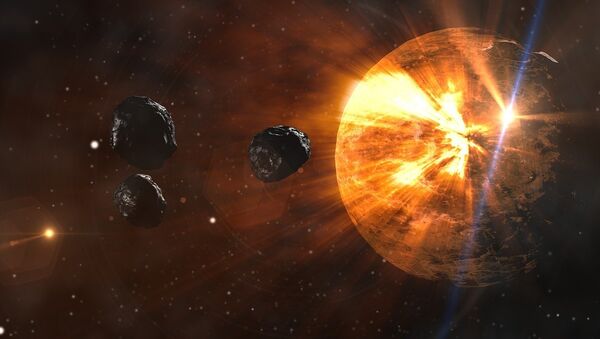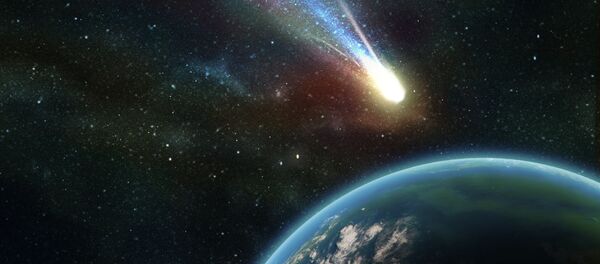Speaking at a press conference in Luxembourg, leading astrophysicist and senior figure in UK science, Astronomer Royal Lord Martin Rees, has warned world leaders that the planet was extremely vulnerable to the threat of an asteroid strike, and "several hundred million" should be spent annually on protective measures as an insurance policy.
"We are all aware that we on planet Earth are vulnerable to impacts from outside, these have happened in the past. It may not be the greatest risk confronting Earth, but if you make an assessment of what premium is worth paying to reduce impact, you would come up with a figure of several hundred million a year, which the world should be spending to reduce this risk," Lord Martin Rees said.
Presently, there are only two asteroid detection systems in operation internationally; NASA's Scout and Sentry programs. The former looks for Near-Earth Objects, the latter searches for asteroids large enough to destroy cities. These systems cannot observe every point in the sky simultaneously, and even if the pair identified a dangerous asteroid, there is currently no dedicated deflection system in place to halt the asteroid's progress, or mitigate its impact.
100x #AsteroidDay Signatory Lord Martin Rees on asteroids. Join the movement http://t.co/HU8dezeIoz @AsteroidDay pic.twitter.com/qQmQAFhtZs
— Asteroid Day ☄ (@AsteroidDay) December 14, 2014
Lord Martin Rees is just the latest expert to caution against doomsday asteroids.
In December 2016, NASA senior scientist Joseph Nuth warned that the Earth was due a "dinosaur-killer" comet at any moment, and if that came to pass, "there's not a hell of a lot we can do about it." He noted that even if all the world's governments, space agencies and private space companies were given abundant notice of a coming strike, it would take at least five years to create and launch a deflective spacecraft. Additionally, 200 leading academics have signed a declaration, calling for funding of the world's asteroid deflection capabilities to be increased 100 fold.
Luckily, the Earth has frequently avoided being hit by asteroids, albeit often extremely narrowly.
In January 2017 alone, there were numerous near-misses; AG13 barely missed, three separate asteroids almost hit in the space of a week, and BS32 raced past the planet just days after discovery.
@AsteroidWatch Asteroid Tautatis as a threat to mankind: if the danger has passed?https://t.co/nNp0zejUYu pic.twitter.com/ik3InGiHjl
— Леонид Токарев (@MrLeontas) December 30, 2016
However, even a fragment of a passing asteroid hitting the Earth has the capacity to cause considerable economic and environmental damage, as Russians discovered to their cost twice in the space of just over 100 years.
First, in 1908, millions of trees in Siberia were destroyed due to the explosion of a hydrogen-saturated part of a comet in Earth's atmosphere; in 2013, a flaming meteorite crashed into the city of Chelyabinsk, damaging thousands of buildings and injuring more than 1,000 people in the area.
While the doomsday prospect of an asteroid hitting the Earth and wiping out a vast swathe of humanity in one fell swoop is naturally an extremely troubling one, and many esteemed figures evidently consider the possibility a very real and imminent one, others are more circumspect.
Eric Christensen of the University of Arizona is on record as saying the popular conception of asteroids, that "they are menacing and going to kill us all" is not true, and the threat of an "is very easy to overstate and misunderstand."
Moreover, a guide to asteroid impact risk, published by Cornell University, casts doubt on the likelihood of an asteroid capable of wreaking global destruction on a par with the strike that wiped out the dinosaurs.
"A global destruction happens less often than every 10 million years. The amount of destruction depends on the properties of rock. Unless acidic chemicals are released into the atmosphere such an impact does not necessarily have to produce a mass extinction.
"It is highly unlikely a regional or global destruction can occur anytime soon since we have already discovered most near Earth asteroids, and none of them seem to be heading this way. A localized impact has a less than one percent chance of happening in any given year, so the level of risk at any given place or time is also low," the guide states.
It adds smaller meteorites represent a very low hazard, and no human has ever been killed by a small meteorite.
"Traffic, pollution and even lightning are much more dangerous than small meteorites," the guide concludes.




